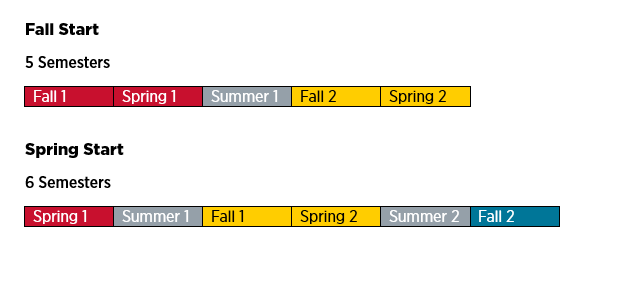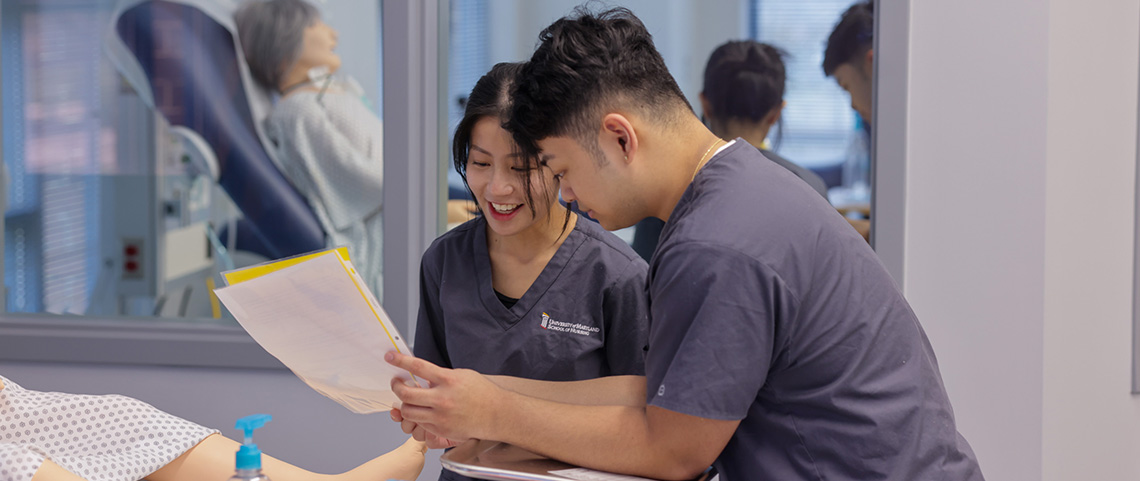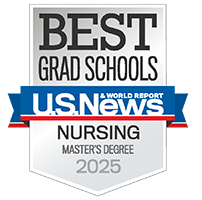Jump to:
For additional admissions-related questions, see our Admissions FAQs.
General Program Information
Why should I choose the MSN-E at UMSON?
- You can be assured of a top-tier education: We are consistently ranked among the top schools nationwide for graduate education by U.S. News & World Report.
- Choose your plan of study (5- or 6-semester options) depending on whether you want to finish faster or you have other responsibilities, such as work or family.
- Take graduate-level electives that may also apply toward a certificate, a second master’s degree, or a doctoral degree, which you would complete after you earn your MSN.
- And don’t forget: We offer extremely competitive in-state tuition.
What is the benefit of earning an MSN rather than a BSN to enter nursing?
In addition to graduating with a valuable master’s degree, you will have more options for leadership, teaching, research, and practice roles. Our MSN-E graduates tend to move rapidly up the career ladder. Also, the MSN-E allows you to take graduate-level electives, as mentioned above.
Can I do the program part-time?
No. We offer two plans of study (5- and 6-semester plans) and both are considered full time. This is important, as you are eligible for federal financial aid, no matter which plan you choose. The 6-semester plan provides more flexibility if you need to work or have other responsibilities. Remember that you should prioritize nursing school while you are in school.
What is the difference between the 5- and 6-semester plans of study?
The 5-semester option is accelerated and takes approximately 60 hours a week for class, lab, clinical, and study time. We strongly recommend against working while enrolled in this plan. The 6-semester plan allows you to take one fewer class per semester and have an additional summer for coursework, internships, or working.
The chart below shows the timelines.

What elective options do I have?
You can tailor your program to your interests and experience by taking graduate electives in the School of Nursing, the University of Maryland, Baltimore (UMB) Graduate School, or other UMB professional schools.
Can I work toward a certificate or another Master's Degree while I'm completing this MSN?
Yes. After beginning your coursework for the MSN-E program, you can apply to a certificate or another master’s program at UMSON or other UMB schools.
Can I work while I complete this program?
Yes. Many students work part time while in the 6-semester option. We strongly recommend you do not work during the accelerated 5-semester option.
I eventually want to earn a DNP or PhD. How many credits transfer from the MSN-E?
After you graduate from the MSN-E program and you apply and are accepted to an UMSON doctoral (DNP or PhD) program, you can transfer 9 credits into the DNP program and up to 6 credits into the PhD program from MSN-E required coursework and electives.
Do I have to find my own clinical sites?
No. One of the benefits of choosing to earn your nursing degree at UMSON is that we arrange all clinical experiences for you.
Where are the clinical sites?
Clinical sites are located across Maryland and Washington, D.C., primarily in central Maryland and in and around Baltimore. Your clinical site may be up to an hour’s drive from UMSON’s Baltimore campus.
Applying to the MSN-E Program
How do I prepare a strong application?
Aside from having a strong academic record, successful applicants often have experience as athletes, servers, or baristas, or they may have shadowed in health care, worked on research teams, taken care of a family member, or put themselves through school successfully. In your resume and essay, highlight these kinds of experiences.
If you do not meet the GPA criteria, consider retaking prerequisites you did not do well in, and when you do apply, be sure to complete the supplemental essay to explain. Your transcript should demonstrate recent academic success. Finally, make sure your application is complete by the deadline for the semester you choose.
Do not hesitate to reach out to our Office of Admissions and Student Scholarships team at admissions.nursing@umaryland.edu for help at any point along the way.
How do I write a successful essay?
Your essay should be personal and respond to all the question prompts. We want to know about you.
The essay is an opportunity to write about why you are choosing nursing, what personal strengths you bring, and your goals and career plans.
If you have something in your resume or academic history that stands out, whether good or questionable, please address it in your primary essay.
Be specific. The best essays are clearly written and include details that reflect you as a person.


